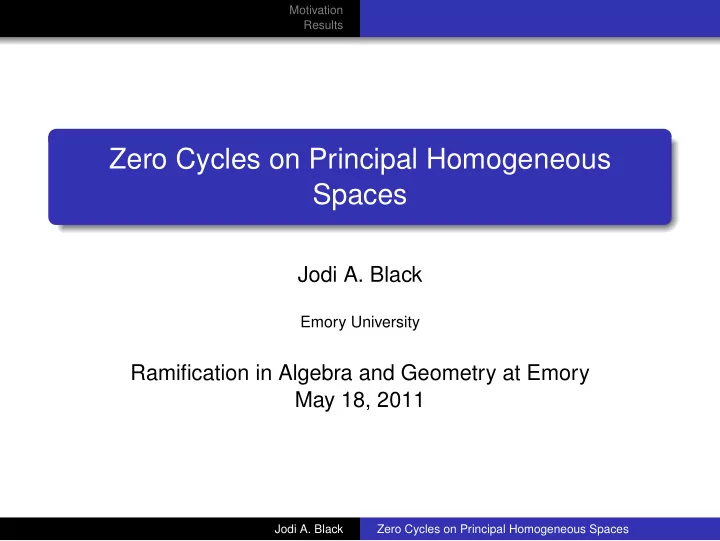

Motivation Results Zero Cycles on Principal Homogeneous Spaces Jodi A. Black Emory University Ramification in Algebra and Geometry at Emory May 18, 2011 Jodi A. Black Zero Cycles on Principal Homogeneous Spaces
Motivation Results A Question of Serre Serre’s Question (1962) Let k be a field and let { L i } m i = 1 be a set of finite field extensions of k of coprime degree. If G is a connected linear algebraic group over k , does the canonical map m H 1 ( k , G ) → H 1 ( L i , G ) � i have trivial kernel? Jodi A. Black Zero Cycles on Principal Homogeneous Spaces
Motivation Results Zero Cycles on Principal Homogeneous Spaces There is a bijection between H 1 ( k , G ) and the set of isomorphism classes of principal homogeneous spaces under G over k . A positive answer to Serre’s question would give a positive answer to: Q(PHS): Let X be a principal homogeneous space under G over k . If X admits a zero cycle of degree one, does X have a k -rational point? Jodi A. Black Zero Cycles on Principal Homogeneous Spaces
Motivation Results Zero Cycles on Principal Homogeneous Spaces There is a bijection between H 1 ( k , G ) and the set of isomorphism classes of principal homogeneous spaces under G over k . A positive answer to Serre’s question would give a positive answer to: Q(PHS): Let X be a principal homogeneous space under G over k . If X admits a zero cycle of degree one, does X have a k -rational point? Jodi A. Black Zero Cycles on Principal Homogeneous Spaces
Motivation Results There are examples of other types of homogeneous varieties which may admit zero cycle of degree one but have no rational point. X a quasi-projective homogeneous variety (Florence, 2004) X a projective homogeneous variety (Parimala, 2005) Jodi A. Black Zero Cycles on Principal Homogeneous Spaces
Motivation Results Conjecture II Serre’s Conjecture II (1962) Let k be a perfect field, cd ( k ) ≤ 2. Let G be a simply connected semisimple algebraic group over k . Then H 1 ( k , G ) = { 1 } . Jodi A. Black Zero Cycles on Principal Homogeneous Spaces
Motivation Results Serre’s Conjecture II is true if: G is a classical group (Merkurjev-Suslin,1990), (Bayer-Parimala, 1995) G is of type F 4 or G 2 (Serre, 1995) special cases of groups G of type 3 , 6 D 4 , E 6 , E 7 (Garibaldi, 2001) (Gille, 2001) (Chernousov, 2003) A positive answer to Serre’s question would imply a positive answer to Conjecture II for G split and of type E 8 . Jodi A. Black Zero Cycles on Principal Homogeneous Spaces
Motivation Results Serre’s Conjecture II is true if: G is a classical group (Merkurjev-Suslin,1990), (Bayer-Parimala, 1995) G is of type F 4 or G 2 (Serre, 1995) special cases of groups G of type 3 , 6 D 4 , E 6 , E 7 (Garibaldi, 2001) (Gille, 2001) (Chernousov, 2003) A positive answer to Serre’s question would imply a positive answer to Conjecture II for G split and of type E 8 . Jodi A. Black Zero Cycles on Principal Homogeneous Spaces
Motivation Results Known Results The answer to Serre’s question is yes if: G is an abelian group (trivial case) G = O ( q ) (Springer’s theorem) G = PGL n (classical result) k is a number field (Sansuc, 1981) char ( k ) � = 2 and G = Iso ( A , σ ) = { a ∈ A : σ ( a ) a = 1 } (Bayer-Lenstra, 1990) Jodi A. Black Zero Cycles on Principal Homogeneous Spaces
Motivation Results Results Theorem (B., 2011) The answer to Serre’s question is yes if: char ( k ) � = 2 and G is a simply connected or adjoint 1 semisimple algebraic group of classical type k is perfect, vcd ( k ) ≤ 2 and G sc is of classical type, type 2 F 4 or type G 2 Jodi A. Black Zero Cycles on Principal Homogeneous Spaces
Motivation Results Key Ingredients Part I Theorem (Gille, 1993) (Merkurjev, 1995) Let k be a perfect field. Let T be an algebraic k -torus and let G 1 and G be a connected reductive k -groups such that the following sequence is exact: f � G 1 � G � T � 1 1 Then N L / k ( f ( RG ( L )) ⊆ f ( RG ( k )) Jodi A. Black Zero Cycles on Principal Homogeneous Spaces
Motivation Results Key Ingredients for Part II Let k be a perfect field with vcd ( k ) ≤ 2 and let k v denote the real closure of k at an ordering v . Theorem (Bayer-Parimala, 1998) Let G be a simply connected semisimple group of classical type, type F 4 or type G 2 then H 1 ( k , G ) → � H 1 ( k v , G ) v is injective. Jodi A. Black Zero Cycles on Principal Homogeneous Spaces
Motivation Results As a consequence of the results on similitudes used in the proof of the first result, we find that if ( A , σ ) and ( A ′ , σ ′ ) are central simple algebras with involution of the first kind over k which become isomorphic over an odd degree extension of k , then they are isomorphic over k Jodi A. Black Zero Cycles on Principal Homogeneous Spaces
Motivation Results Thanks! Jodi A. Black Zero Cycles on Principal Homogeneous Spaces
Recommend
More recommend